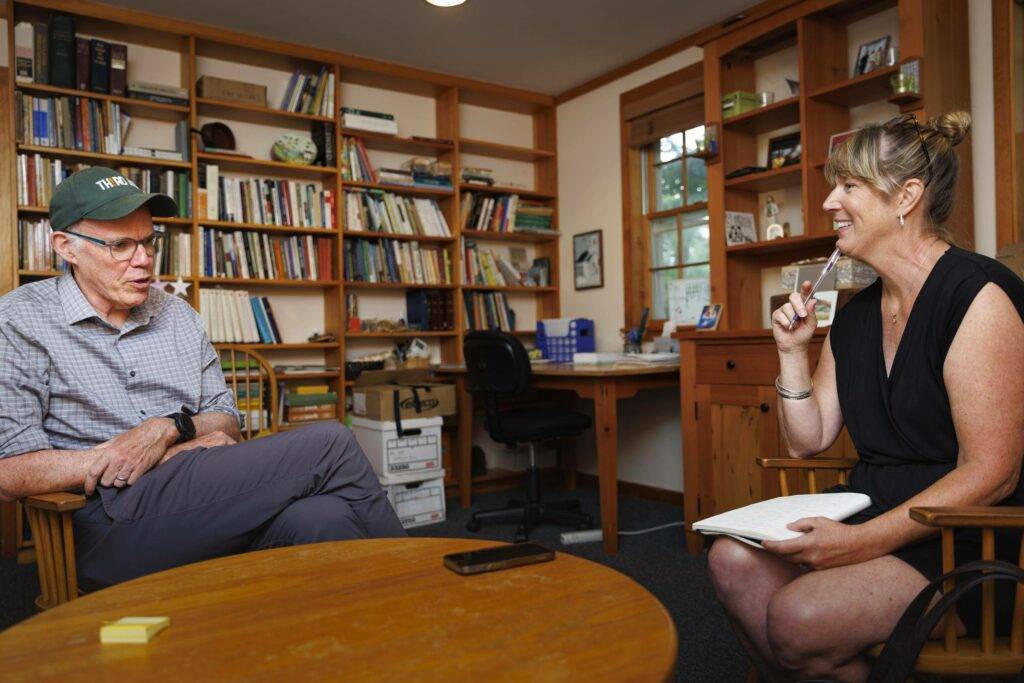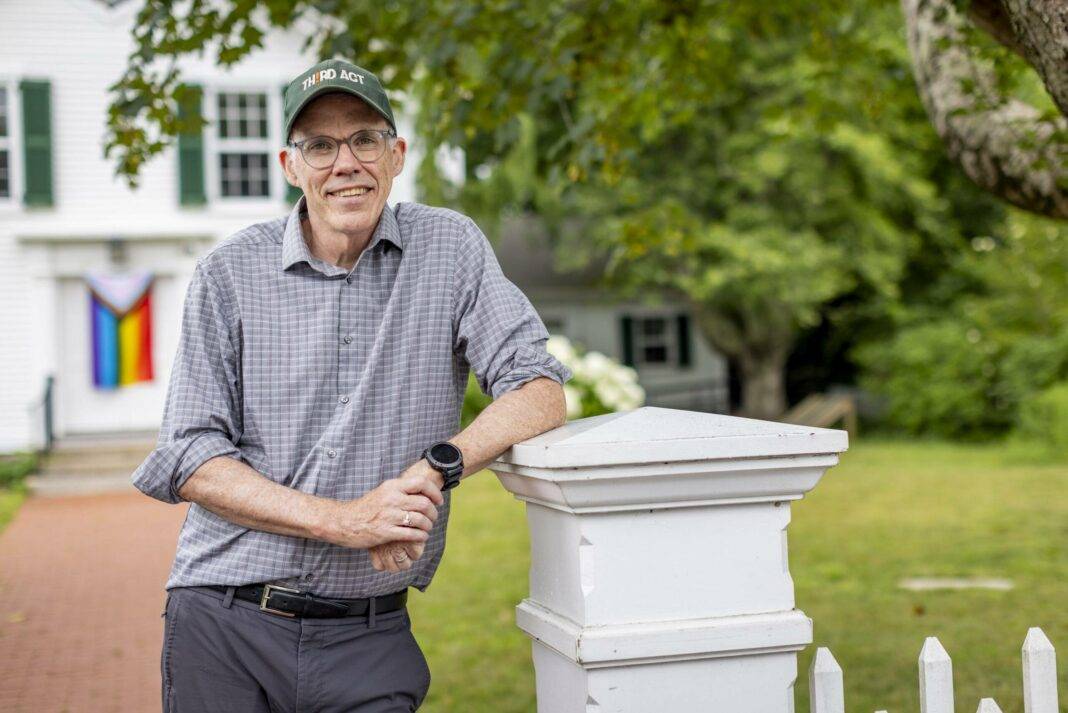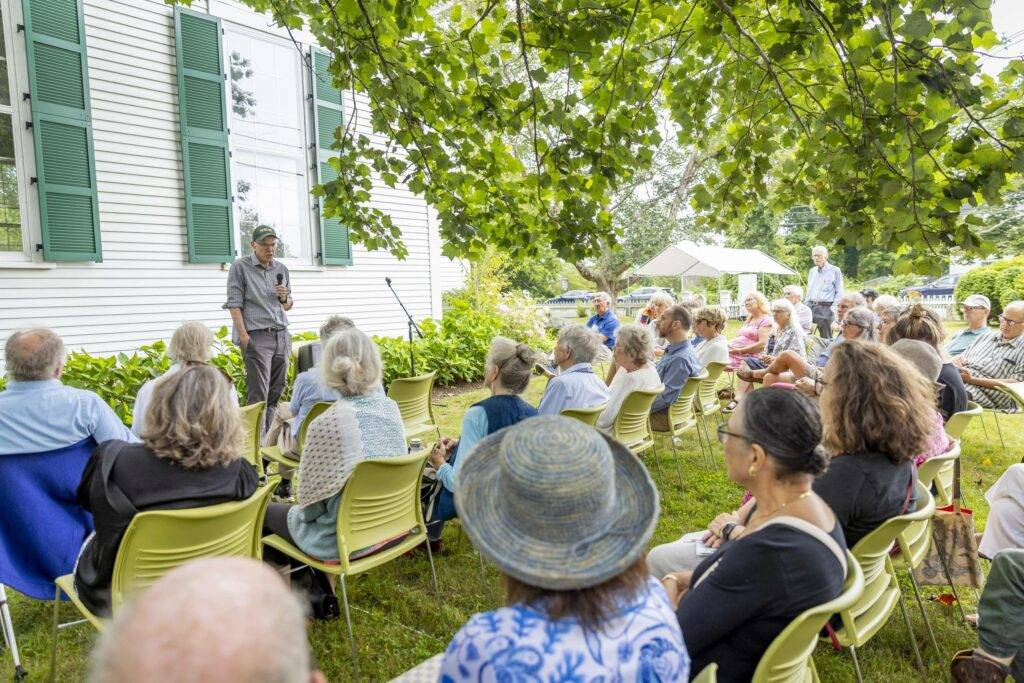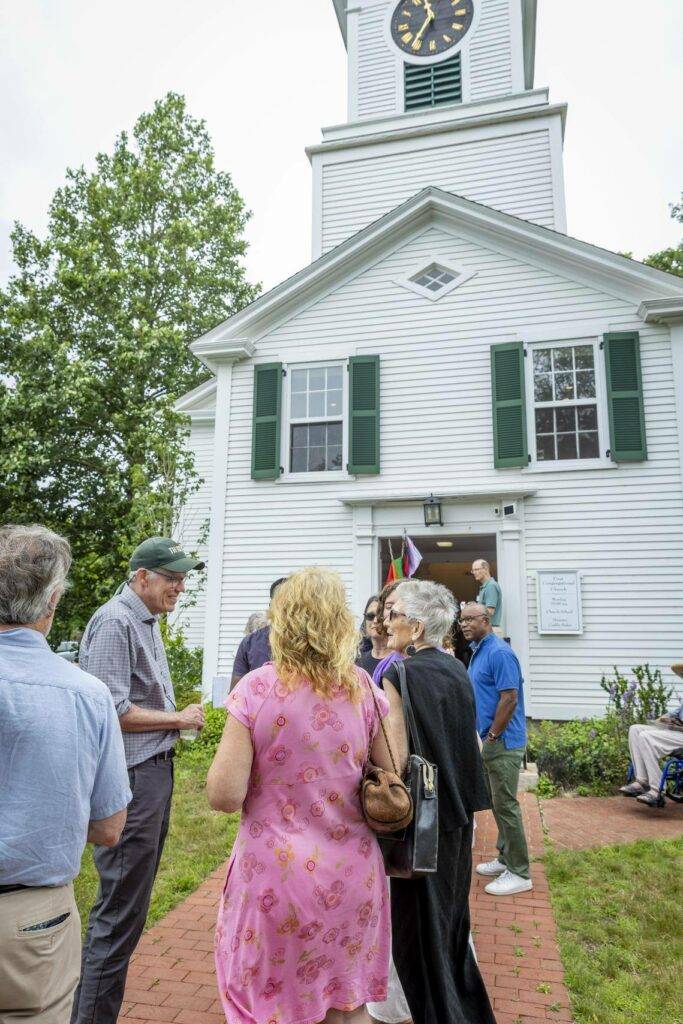Writer, organizer and climate activist, Bill McKibben recently visited Martha's Vineyard to talk about Third Act — his latest initiative for those over age sixty.
Climate luminary Bill McKibben hardly needs an introduction, but his new project does. Now 62 years old, having participated in numerous pivotal environmental campaigns over the past forty years, McKibben has created a new program called Third Act (thirdact.org; see more below) to mobilize 60-plus-year-olds to use their political and financial clout and stand alongside the young people fighting for their future. He’s optimistic about his generation stepping into this moment. “People,” McKibben says, “are ready to go.”
Bluedot Editor Leslie Garrett talked with Bill McKibben after he spoke to an overflow crowd at the West Tisbury Congregational Church on Martha's Vineyard in July.
Interview edited for brevity and clarity.
Leslie Garrett: You mentioned you spent time on Martha’s Vineyard when you were a kid. My editor would kill me if I didn’t get a bit more detail about your experiences here.
Bill McKibben: We’d come for a week every summer, every year for eight or ten years. There was a house … someone said it’s still there. Multi-colored panels, sort of halfway on the beach on Gay Head, nothing around within a mile or two on either side. It was the high point of the year.
LG: When you think back, what stands out?
BMcK: So many things that are familiar and unchanged. We would go to Menemsha to get bluefish in the afternoon. We used to love running down the dunes and climbing through the clay cliffs. (I sort of hope that they tell people not to do that anymore.) Mostly we just played in the ocean hour after hour. I got to go into the ocean yesterday, and it brought back many memories. I mean, I chose to live up in the mountains, and I love the mountains and the forests, but it was a powerful dose of nostalgia to be here. And very nice to see that, in certain ways, this place has changed less than other places.
LG: From what I’ve read, it sounds like your childhood was pretty rooted in the natural world, including coming here. Do you trace that to the work you do now?
BMcK: Yes, my father grew up out west, loved the outdoors, and loved to hike. [The outdoors] was important to me growing up, but I didn’t think it was going to be my life’s work. I was interested in homelessness and other urban questions. A week after I graduated from college, I went to the New Yorker to write the Talk of the Town, a quintessentially urban thing. But in the late 1980s, when I was in my mid late 20s, reading the early science about climate change, I became convinced that this was the overwhelming story of my lifetime. I’ve been on it ever since. That first book in 1989 [McKibben’s “The End of Nature”] was … about climate change. It was excerpted in the New Yorker and came out in twenty four languages, and that sort of sealed my course.
LG: I came to climate writing through a social justice lens … and very quickly learned that companies that could care less about their workers could care less about the environment. Do you think people have made that sort of connection with climate? That climate issues include homelessness and racial injustice?
BMcK: Yes, people talk much more about climate justice now than they used to. And the basic understanding that the people who are suffering the worst did the least to cause it is an important revelation.
LG: The conversation taking place around the UN and the Green Climate Fund [the fund to help developing countries respond to climate change] … I’m immersed in it, yet it still feels kind of remote. It feels sort of like it’s happening over there.
BMcK: I don’t think our Congress will be quick to pay loss and damages to the rest of the world. But I do think there’s momentum building to at least make it easier for people in the Global North to finance the kind of work that needs to be done in the Global South.. Figuring out how to free up that money, take the risk out of those investments so people can make them at a reasonable rate — that kind of thing is really important. Your neighbor John Kerry is really leading the work on that.
LG: Where else do you see leaders right now?
BMcK: Young people. I think we were extraordinarily lucky that Greta Thunberg appeared when she did. And our first real climate rockstar was not a diva, she was a good soul. Happily, we’re now seeing a lot of older people stepping up to help. The growth of this work at Third Act has been much more explosive than we’d imagined. That’s a good sign, I think.
LG: I have young adult children. I see a lot of anger in young people.

BMcK: Rightly so. It’s the sense of having been abandoned to figure this out on their own. And anger that we got to live through a relatively easy period, and they’re not going to.
LG: And that was part of your thinking with Third Act — to say “we’ve got your backs?”
BMcK: It’s good for people to be able to say that, and for kids to hear it. It offers some relief, anyway. That sense of being abandoned is a difficult thing.
LG: You mentioned that people over age sixty lived through the civil rights movement. How does this fight feel different from the civil rights movement? Or maybe it doesn’t.
BMcK: One way in which it’s easier now is that, at least in this country so far, people aren’t killing you or blowing up your churches. One way in which it was easier then is that ’there was no multi-trillion dollar industry that depended on segregation. By the end [with civil rights], business was more or less on the right side. In this case, there is a trillion dollar industry using a huge percentage of its money to make sure it can continue its business model indefinitely.
LG: When you created 350.org, you gave a vocabulary to the climate issue. You literally gave it a number. What is the power of that?
BMcK: One of the reasons we did that was because we needed to organize globally. We were organizing demonstrations in every country except North Korea, and it would have been much harder if we’d been using English words. Arabic numerals cross linguistic boundaries more easily. But people said it was too depressing a number, because we’re already past 350 parts per million in the atmosphere. A point I took, but I think that’s actually been helpful. It’s like cholesterol: if your doctor says, ’Keep eating like this, and someday your cholesterol will be too high,” you just keep eating until your cholesterol gets too high … but if the doctor says, ’You’re in that zone where people have heart attacks, and you might have had a little stroke yourself already,’ then it’s like, ’What pill do I take now?’ Urgency concentrates the mind.
LG: You have said, “we become most fully human when we don’t put ourselves at the center of everything,” and that the most important thing an individual can do right now is not be such an individual. What do you want people to take away from that?
BMcK: Well, given the scale of the challenge, it’s not practical to imagine solving it one person at a time; it won’t add up fast enough. You need to figure out how to leverage your efforts, and the only way to do that is to find other people and form movements that can shift real power. If five percent of people lived responsibly in their own homes, it’ would be good, but it wouldn’t really change the trajectory. But if you can get five percent of Americans really engaged, that will be more than enough to win most of these fights, because there’s so much apathy that five percent of people turn out to be a huge force — enough to stand up to all the money in the world. But we’re not there yet. We’re at about two percent.
LG: We’re such an individualistic society.
BMcK: And much more so than when I was growing up. The election of Ronald Reagan represented a decision to become hyper individualist. He said, ’government is not the solution, it’s the problem.’ Hence, working together was the problem. His theory was that markets solve all problems. We’ve now tested that rigorously, and the Arctic is melting.
LG: It’s also the case that when there is a natural disaster, people come out of their houses, pick up shovels, and help.
BMcK: There’s a wonderful book that Rebecca Solnit wrote called A Paradise Built in Hell, on just that subject. I think about it often.
LG: On an island, there tends to be a greater sense of interdependence. I don’t know how familiar you are with some of the work Martha's Vineyard is doing, but I’m wondering if you’ve seen things that you think we’re getting right.
BMcK: Clearly, land preservation is something that people have taken seriously and done well. Of course, it’s particularly hard to do in a place where real estate prices are as high as they are here, so that’s a really powerful step. And now, the Vineyard is poised to be playing an important role: The wind resources around here are very real. I hope very much that people figure out how to speed up rather than slow down this process.
LG: You’ve mentioned that you’ve seen some climate wins, and referred to the Inflation Reduction Act. What else do you look to?
BMcK: We know that when we rally together, we can win, because we stopped the Keystone pipeline and other projects like that. We know that we can shift truly powerful institutions. It took ten years, but we convinced Harvard to divest their fossil fuel investments, followed by Oxford, Cambridge, Princeton, the University of California, and the New York State Pension Fund …. You know, we’re beginning to see at least a glimmer in the legal arena [of people] going after the fossil fuel industry for the damage they’ve caused. [Massachusetts governor] Maura Healy played a big role in that as AG, and I’m sure she’ll keep the pressure on as governor. Massachusetts is blessed with some really interesting officials right now. I think the mayor of Boston [Michelle Wu] is one of the most remarkable public officials in the country. Massachusetts could be a real leader.
LG: What do you do to shore yourself up? Because this is not easy work.
BMcK: I don’t think I could do the work I do if I couldn’t get outdoors on a regular basis. I don’t know how people who live in places where there’s no access to nature quite manage it, because for me, it’s crucial. That’s one of the great blessings you have here. You’re never more than ten minutes away from getting in the waves and really submerging yourself in the beauty of the world.
LG: You mentioned in an interview that you’re a big cross-country skier.
BMcK: That’s my vice. It may have been a bad choice, because there’s no no pastime more vulnerable to climate change than Nordic skiing, but I love it.
LG: My dad used to flood our backyard every winter to make a skating rink. My husband’s tried, and it just doesn’t work anymore.
What would you like people to know about your work with Third Act?
BMcK: I think if people are looking to do good work in good community, they may really enjoy this Third Act. And we have [solid] working groups in all the places that [Bluedot] publishes. In a bunch of states now, they’re busy going after the public utility commissions, which are the key players in a lot of [climate-related] decisions. One of the advantages of older people [is] the fact that when something happens on a Tuesday, it doesn’t prevent someone from going. College kids are in college on Tuesday, working people are at work on Tuesday. So the only people who show up [to climate-related proceedings] are lobbyists from the fossil fuel industry. But if we show up (and now we do), that’s very important.
We’re doing a lot of work around the promotion of democracy, because we don’t think we can do any of this without a healthy democracy. Lots and lots of voter registration. [We have a] great senior to senior project — where older people write high school seniors [about the value of voting]. In an election year, we’re excellent at mobilizing people for phone banking and door knocking. Local chapters are coming up with their own thing; Massachusetts has been working on the proposed expansion of Hanscom Field as a private jet airport in the Boston suburbs, and I think we’re gonna win that fight. I find it hard to believe that Mass Port is going to decide that it really needs twenty new hangars for rich people’s jets.
LG: In how many states is Third Act working?
BMcK: People have a fair amount of time, they have resources, and they want to give back. We have groups in thirty states at the moment, and it’ll be all fifty by the end of the year. There are a lot of different ways for people to get involved.
LG: And the beauty of aging is you just don’t care anymore. [laughs] I’m not here to make friends.
BMcK: Kids have to worry about getting arrested in a demonstration — it’s not so good for your resumé. But really, past a certain point, what the hell are they going to do to you anyway?
LG: Are there Third Act chapters outside of the U.S.?
BMcK: [There’s a lot of interest], but we’re trying to hold off for another six or eight months. We’ve got to raise enough money to make it work — really work — here. I think after the 2024 election, we’ll spread rapidly around the world.
More About Third Act
“Kids completely get it,” McKibben told an audience of mostly 60-plussers, the day before he delivered the sermon at First Congregational in West Tisbury.
“They get it about democracy and about civil rights and about all the other things. But I’ve heard one too many people say to me, oh, it’s up to the next generation … and it also seemed highly impractical, because these are timed tests. We don’t have time for great high school students to grow up and become CEOs and senators ….”
McKibben’s message is urgent. “The next 18 months or two years are going to be very violent and chaotic,” McKibben predicted. “But the deeper problem is, we’re still on a path to raise the temperature of the planet about three degrees Celsius, five or six degrees Fahrenheit. And if we do that, we will not have civilizations like the ones we’re used to having. The UN estimates [the rise in temperature] would create a billion refugees by the middle of the century.”
But McKibben, who’s been beating this drum since the late 1980s isn’t about to give up now. “The good news is: we don’t need to go there, necessarily,” he said. “We know now mostly what we need to do.”
He points to the drastic reduction in the cost of renewable energy in the past decade. “We live on a planet where the cheapest way to produce power is to point a sheet of glass at the sun,” he said, “which is [like a] water-into-wine miracle.”
The challenge? The fossil fuel industry is fighting too. “And they’re extraordinarily powerful,” McKibben said. “So that’s why organizing is such an important part of this task. We need to open up more political space for leaders who want to do the right things, we need to boot out leaders who don’t want to do the right thing. We need to put pressure on the fossil fuel industry.”
McKibben takes some comfort in the progress he’s already seeing. “We’ve watched over the last few years as really remarkable things have started to happen. The rise, in particular, of the Youth Climate movement has been a wonderful thing. But young people, for all their energy and intelligence and idealism, lack the structural power to make change on the scale we need in the time that we have.” McKibben’s response? Third Act.
“Ask yourself the question, who has a lot of structural power in our society? Well, a certain amount of it is people with hairlines like mine. Our theory was that it would be possible to mobilize older people in large numbers to really push for change on democracy and on climate. We all knew that pollution was a bad thing, which is why people marched on Earth Day. And then we got the Clean Air Act and the Clean Water Act, and things got better. It did not occur to us that we were going to melt the North Pole and the South Pole, [or] that we were going to reach a point where large numbers of Americans were invading the nation’s Capitol and killing police officers to stop the counting of votes.
“[So now] we want to start mobilizing. No one’s tried to do this on a large scale in quite a while. Political scientists have long declared that people become more conservative as they age, which may have been true at a certain point. But I think [it’s] not true of this generation of older people, who, in their first act, were around for that epic period of social, cultural and political change when we started taking women seriously in public life, the apex of the civil rights movement, the first Earth Day [when] 20 million Americans marched in the streets.
“So it’s high time to remobilize. There are seventy million Americans over the age of sixty — 10,000 more every day, which is more than the number of people born in this country every day. Not only are there a lot of us, but also, we punch above our weight politically, because we all vote. And we ended up with about seventy percent of the country’s financial assets. [Because of this], I think the odds on this paying off are as high as anything I’ve ever been engaged in. People are flooding in; they’re just ready to go.”
What You Can Do
Get involved! You can support 350.org and Third Act (thirdact.org/donate/) financially, or log onto their sites for info on other ways to get involved. Third Act’s donate page invites you to take action individually, such as its Senior to Senior program, which encourages third actors to send letters to high school seniors about the importance of voting, or collectively, such as finding a working group or attending an event.





what a terrific interview with the iconic Bill McKibben…and a great get by Ms Garrett…loved all of it except that church bombings may not be plentiful but people are being killed daily and the violence is getting worse everyday…worse than that is the insidious corporate silence and lip service to climate issues and other problems like homelessness that need government and corporate cooperation…but all in all he is right and has been a champion of a great cause for many years now…. young people don’t really have the power to affect most issues except maybe at the voting booths…demonstrations are helpful but steady pressure is more likely to bring about necessary change…thanks for such a stellar and important interview